Understanding the Foundation of Emotional Resilience
Emotional resilience is a vital component of personal growth and success. It encompasses the ability to adapt swiftly to life's challenges, recover from setbacks, and emerge stronger. Recognizing its importance lays the groundwork for harnessing resilience to build meaningful future goals.
What Is Emotional Resilience?
What is emotional resilience?
Emotional resilience is the capacity to respond adaptively to stressful, challenging, or unexpected situations. It allows individuals to recover quickly and maintain a positive outlook despite facing adversity. At its core, resilience involves flexibility in mental, emotional, and behavioral responses, helping people navigate difficulties without becoming overwhelmed or discouraged.
This skill helps individuals handle setbacks like job loss, illness, or personal loss by harnessing inner strength and a balanced perspective. Resilient people are able to see problems as temporary and manageable, which fosters hope and motivation to move forward.
Components of resilience: mental, emotional, behavioral
Resilience involves several interconnected elements:
- Mental elements include adaptability, focus, self-esteem, and emotion regulation. These help manage thoughts and reactions during stressful times.
- Emotional components encompass managing negative emotions like fear or sadness and fostering positive feelings such as hope, gratitude, and optimism.
- Behavioral aspects involve actions like seeking support, problem-solving, engaging in self-care, and maintaining healthy routines.
Together, these components form a dynamic system that enables a person to bounce back from difficulties and grow through challenges.
Factors influencing resilience
Many factors can influence how resilient someone is:
| Factor | Description | Impact on Resilience |
|---|---|---|
| Social support | Strong relationships with family, friends, and community | Enhances emotional strength and provides resources during crises |
| Personal experiences | Past difficulties and successes help shape adaptive responses | Builds confidence and problem-solving skills |
| Biological components | Genetic predispositions, brain chemistry, and physical health influence resilience | Affect stress responses and emotional regulation |
| Worldview and mindset | Optimism, growth mindset, and purpose in life | Encourage positive outlooks and persistence |
| Age and developmental stage | Life stage impacts resilience capacity | Younger individuals may develop resilience over time; older adults often have accumulated coping strategies |
| Cultural and environmental influences | Cultural beliefs, community norms, and available resources | Shape attitudes towards adversity and coping approaches |
Building emotional resilience is possible for everyone through practices like fostering strong relationships, maintaining a hopeful outlook, practicing mindfulness, and developing self-awareness. By strengthening these elements, individuals can better manage stress, recover from setbacks, and continue thriving amidst life's challenges.
Why Is Emotional Resilience Crucial?
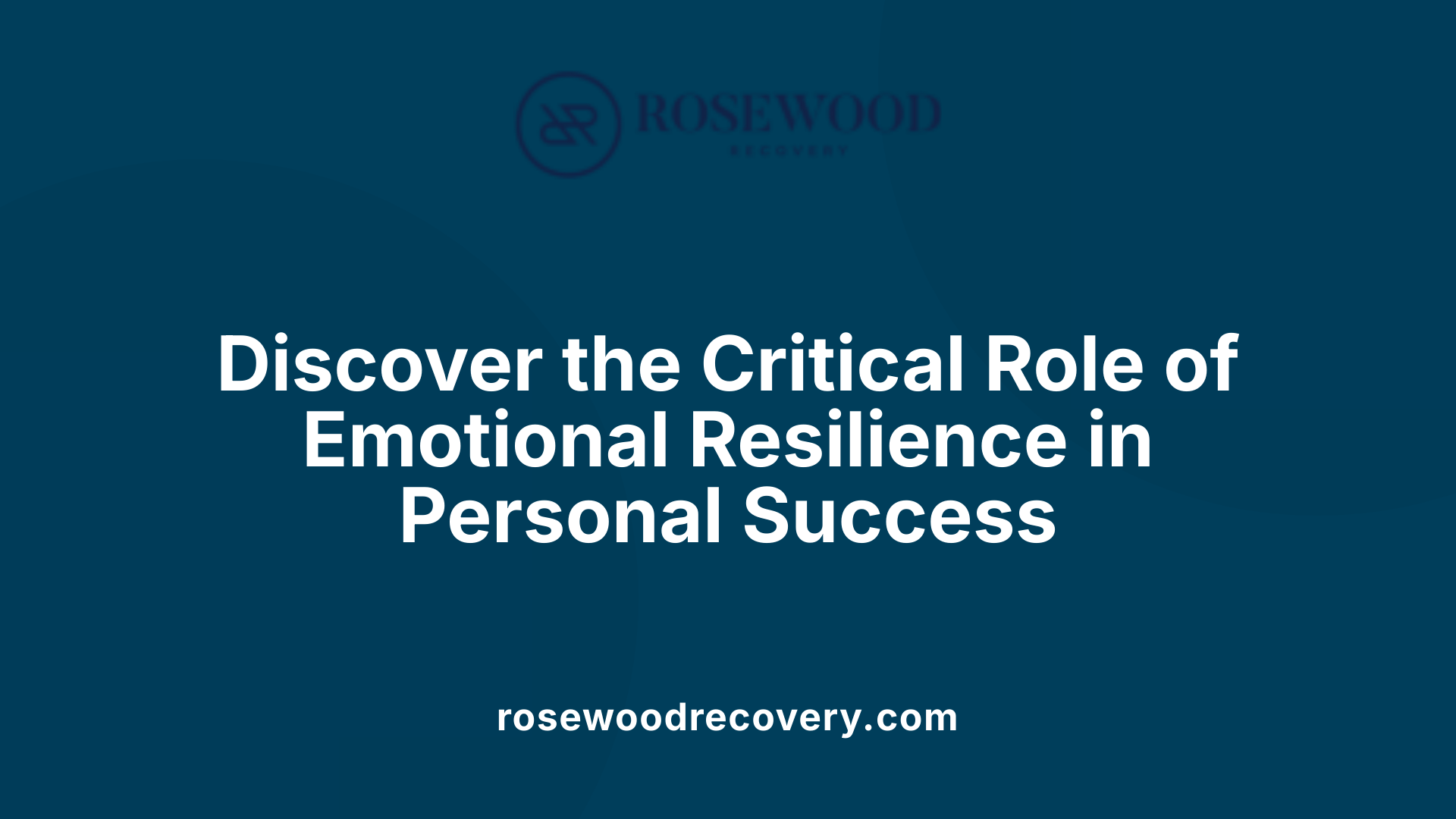
Why is emotional resilience important?
Emotional resilience plays a vital role in how we handle life's challenges. It allows individuals to respond effectively to stress, setbacks, and unexpected changes, helping them recover quickly and maintain their emotional balance.
Having resilience means not being overwhelmed by difficulties but instead adapting and growing from them. This ability supports mental health by lowering the chances of developing conditions like depression and anxiety. Resilient people tend to stay optimistic, regulate their emotions well, and see problems as opportunities for learning.
Building resilience can involve simple daily practices such as nurturing social relationships, cultivating a hopeful attitude, and reflecting on past experiences to learn and grow. These behaviors strengthen mental stability and foster personal development over time.
The benefits extend beyond mental health. Resilience enhances overall well-being, life satisfaction, and perseverance in achieving personal and professional goals. It empowers individuals by boosting confidence and helping them face future challenges with strength and flexibility.
In essence, emotional resilience is a crucial resource that enables people to navigate life's difficulties with hope, patience, and persistence, leading to a more fulfilling and successful life.
Developing Resilience: Strategies and Practical Tips
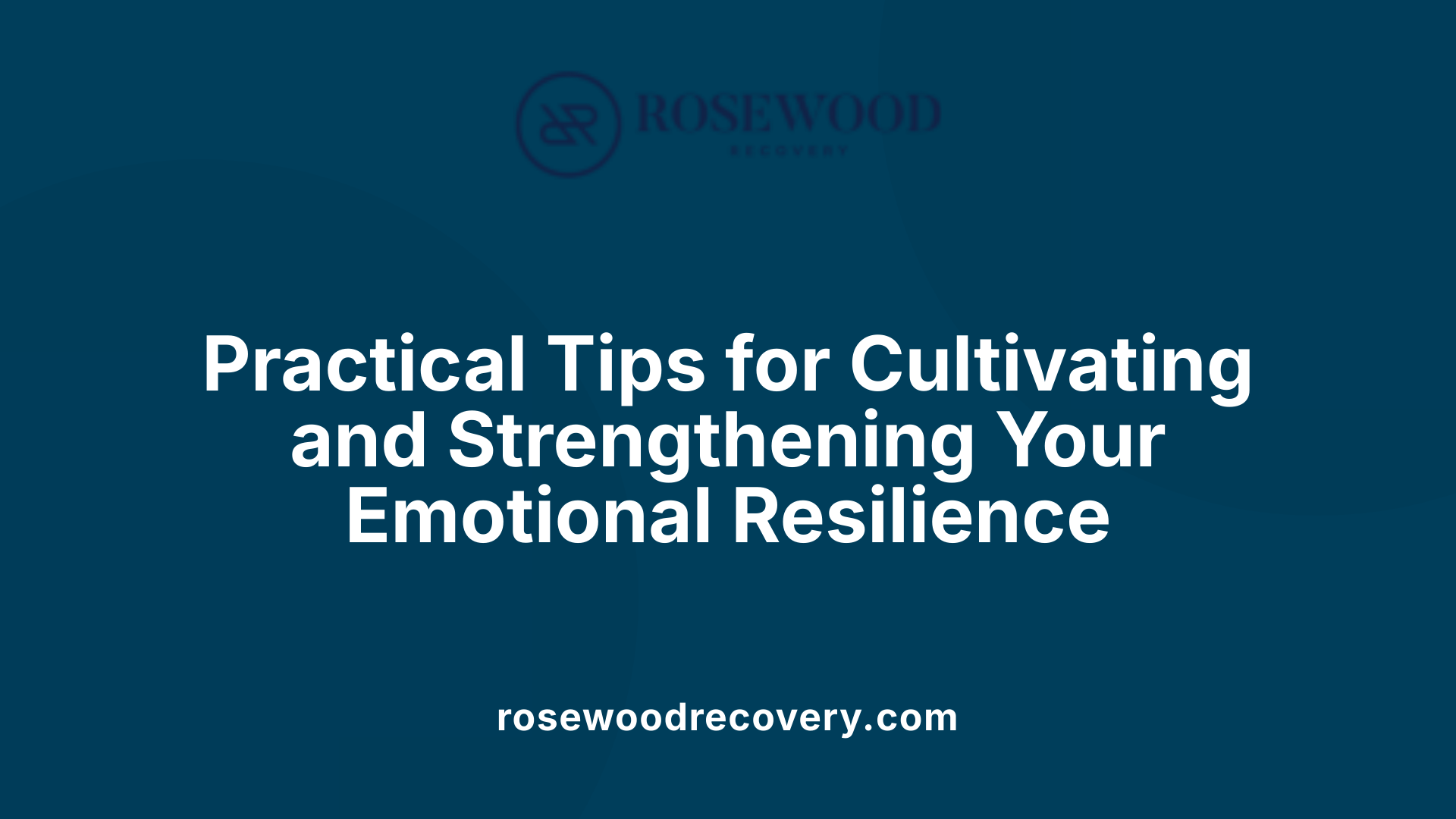
What strategies can be used to develop and strengthen emotional resilience?
Building emotional resilience involves a combination of practices that support mental, emotional, and social well-being. One fundamental approach is establishing strong self-care routines. Regular physical activity, nutritious eating, and sufficient sleep help maintain overall health and provide a solid foundation for resilience.
Equally important is creating a supportive social network. Connecting with friends, family, or community groups not only offers emotional comfort but also practical assistance during stressful times. Building these relationships fosters a sense of belonging and provides different perspectives to help navigate difficulties.
Maintaining a positive mindset is crucial. Practicing gratitude through journaling or mindfulness, keeping a perspective on challenges as temporary, and cultivating hope and optimism can significantly influence how effectively individuals respond to setbacks.
Developing self-awareness is another vital step. Mindfulness exercises, such as body scans or mindful breathing, help individuals recognize their emotional states and stress signals early. This awareness supports better emotional regulation, allowing for adaptive responses instead of reactive ones.
Lastly, purposeful goal-setting and seeking professional support when necessary play a significant role. Setting realistic and achievable goals provides direction and motivation, while professional help—such as therapy or coaching—can offer tailored strategies for overcoming specific challenges and fostering resilience.
Collectively, these practices create a resilient mindset that empowers individuals to adapt, grow, and thrive despite adversity. Incorporating these strategies into daily life can enhance personal growth and improve overall well-being.
Resilience as a Catalyst for Overcoming Challenges and Future Growth
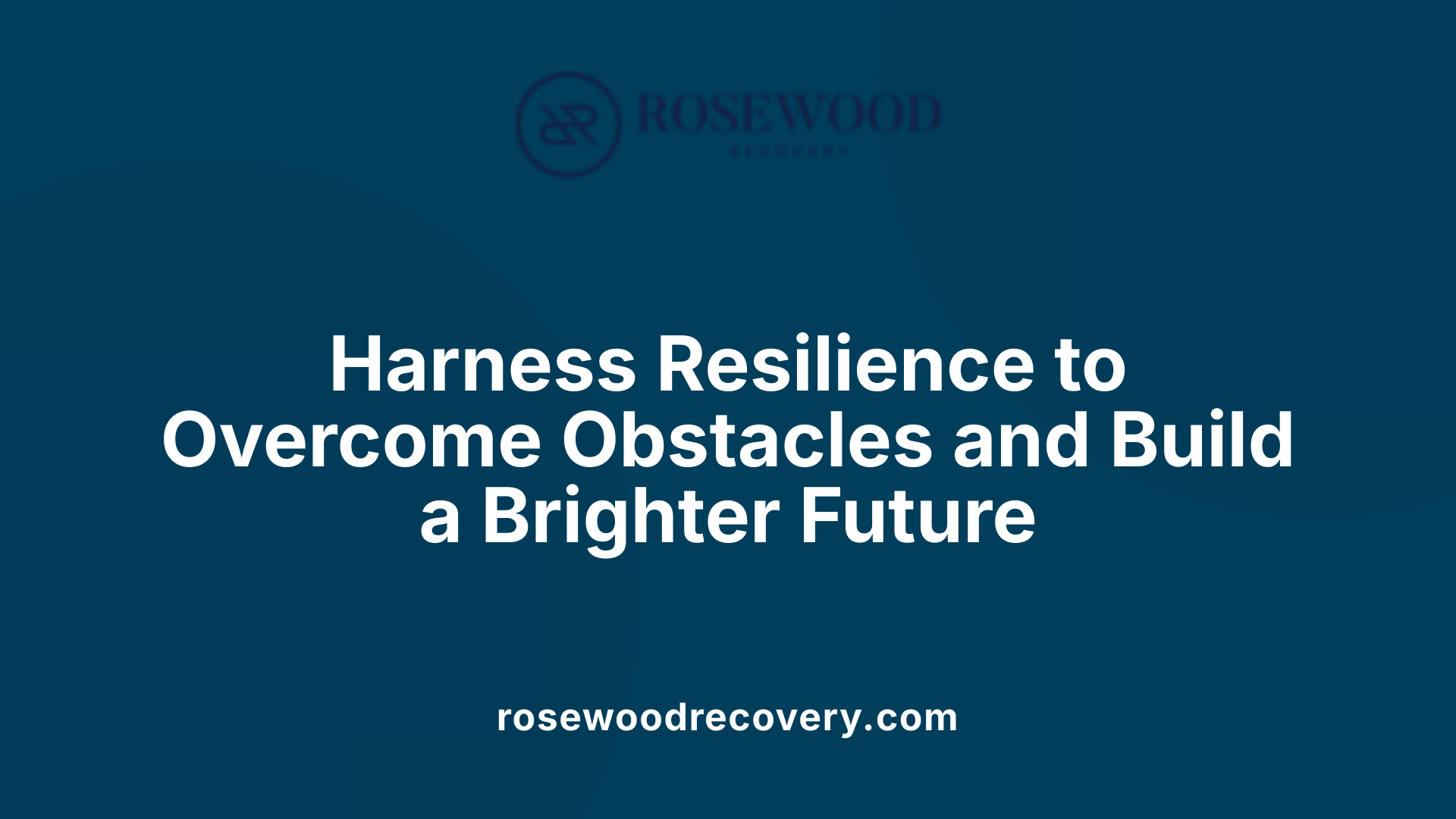
How can resilience support overcoming challenges and building a better future?
Resilience plays a vital role in helping individuals navigate life's obstacles and shape a positive future. It allows us to adapt effectively when faced with adversity, such as health issues, job setbacks, or personal loss. Instead of being overwhelmed, resilient people use healthy coping strategies, maintain a hopeful outlook, and leverage their inner strengths and social connections.
Developing resilience involves learning skills like emotional regulation, problem-solving, and positive reframing of negative thoughts. These abilities can be cultivated through practices like mindfulness, self-awareness, and seeking social support. As individuals face difficulties, qualities such as optimism, self-compassion, and purpose serve as guiding lights, transforming setbacks into opportunities for personal growth.
Resilience not only assists in overcoming immediate adversity but also fosters long-term benefits such as improved mental health, personal development, and a proactive approach to future challenges. By viewing difficult experiences as learning opportunities, resilient people build a more adaptable and hopeful outlook, ultimately creating a stronger foundation for future success and well-being.
The Link Between Emotional Resilience, Emotional Intelligence, and Well-Being
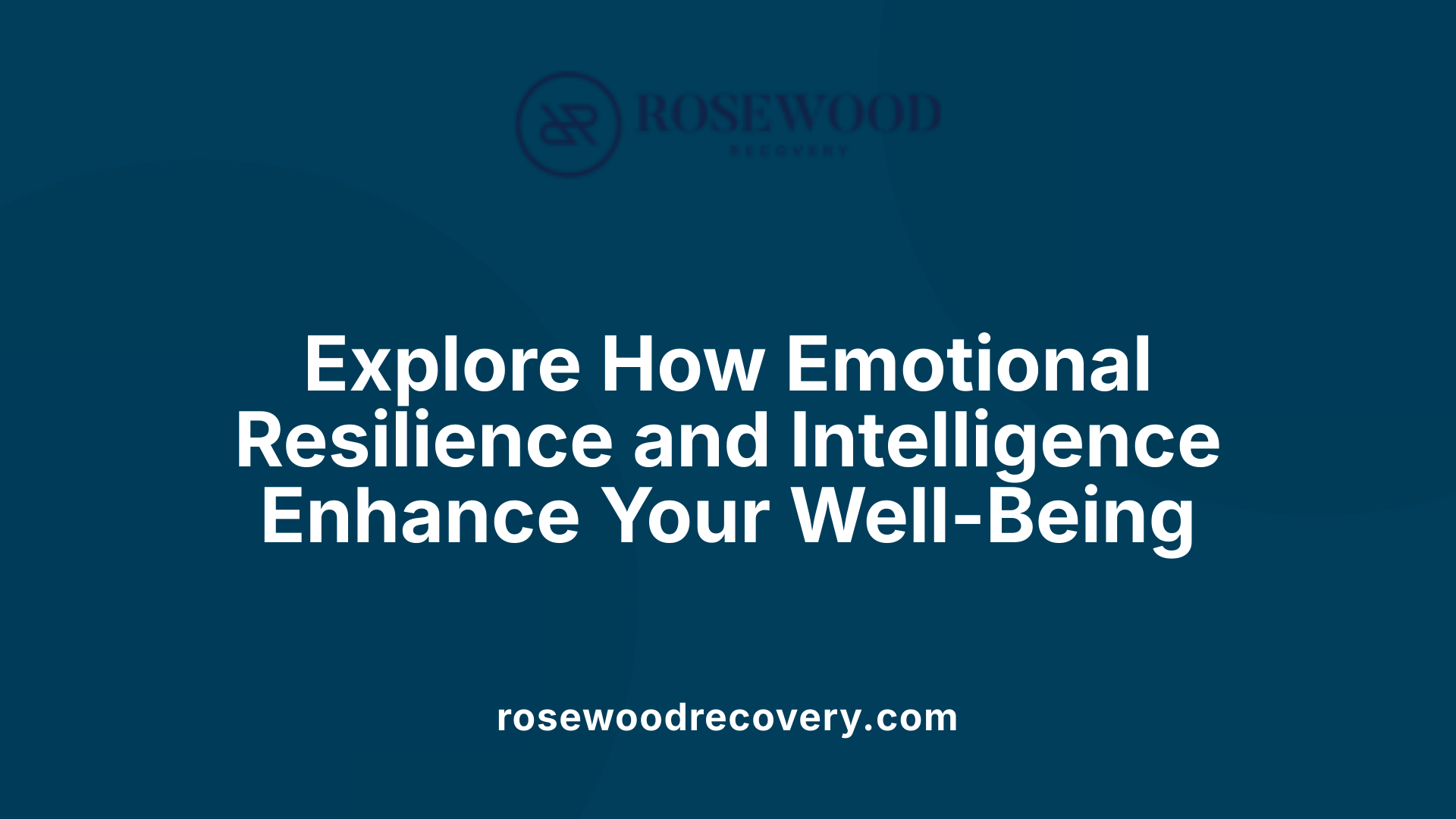
How are emotional resilience, emotional intelligence, and mental well-being interconnected?
Emotional resilience, emotional intelligence, and mental well-being are closely linked through the ways individuals perceive, manage, and respond to their emotions, especially during stressful or adverse situations.
High emotional intelligence (EI) allows people to effectively monitor, understand, and regulate their emotions. This awareness helps them respond to challenges with adaptability and calmness, which strengthens their resilience—the capacity to bounce back from setbacks. When resilience is high, individuals are better equipped to cope with stress, trauma, or personal difficulties, reducing their risk of mental health issues like depression and anxiety.
Conversely, greater resilience supports mental well-being by fostering positive coping strategies and emotional regulation. Resilient individuals tend to view difficulties as temporary and manageable, maintaining hope and motivation even in tough times. This perspective promotes overall mental health, life satisfaction, and personal growth.
These elements reinforce one another: developing strong emotional intelligence enhances resilience, which in turn nurtures better emotional regulation and mental well-being. This cyclical relationship underscores the importance of cultivating both emotional intelligence and resilience as effective ways to boost mental health.
Practicing exercises such as mindfulness, self-reflection, and positive self-talk can simultaneously improve EI and resilience. These skills enable individuals to navigate life's challenges more successfully, fostering a resilient mindset that promotes emotional stability and health.
In summary, a balanced interplay between emotional intelligence, resilience, and mental well-being creates a foundation for a healthier, more adaptable, and fulfilling life. Focusing on strengthening each facet can lead to better stress management, improved relationships, and greater overall happiness.
Using Techniques like Mindfulness, Gratitude, and Reflection to Build Resilience
What are effective techniques for applying emotional resilience in achieving future goals?
Applying emotional resilience effectively involves various practices that strengthen our capacity to manage stress, stay motivated, and adapt to change. Key among these are mindfulness, gratitude journaling, and reflection exercises.
Mindfulness meditation practices help individuals stay present and focused, reducing emotional reactivity to setbacks. Regular mindfulness exercises such as deep breathing or body scans can calm the mind, improve emotional regulation, and foster greater self-awareness. These skills are essential for maintaining clarity and composure when pursuing long-term goals.
Gratitude journaling is a simple yet powerful technique to shift attention from negatives to positives. Writing down three things you're grateful for each day cultivates optimism and appreciation. This habit can boost mood, increase resilience, and reinforce a hopeful outlook, all of which are vital for perseverance.
Reflection exercises, such as reviewing past experiences and identifying lessons learned, help in developing a growth mindset. By understanding how previous challenges were overcome, individuals can better prepare for future obstacles, building confidence and persistence.
Together, these practices create a foundation of mental strength and emotional stability. They support the adoption of healthy behaviors, reinforce motivation, and help maintain focus toward future aspirations.
Benefits of these techniques
Employing mindfulness, gratitude, and reflection leads to enhanced emotional resilience, which in turn improves overall wellbeing. These strategies can reduce symptoms of anxiety and depression, bolster problem-solving skills, and promote a hopeful attitude. Over time, they empower individuals to bounce back from setbacks more quickly and to view adversity as an opportunity for growth.
By integrating these habits into daily life, anyone can develop the ability to endure challenges, remain focused on goals, and foster a resilient mindset that nurtures personal and professional success.
Resilience in Personal and Professional Contexts
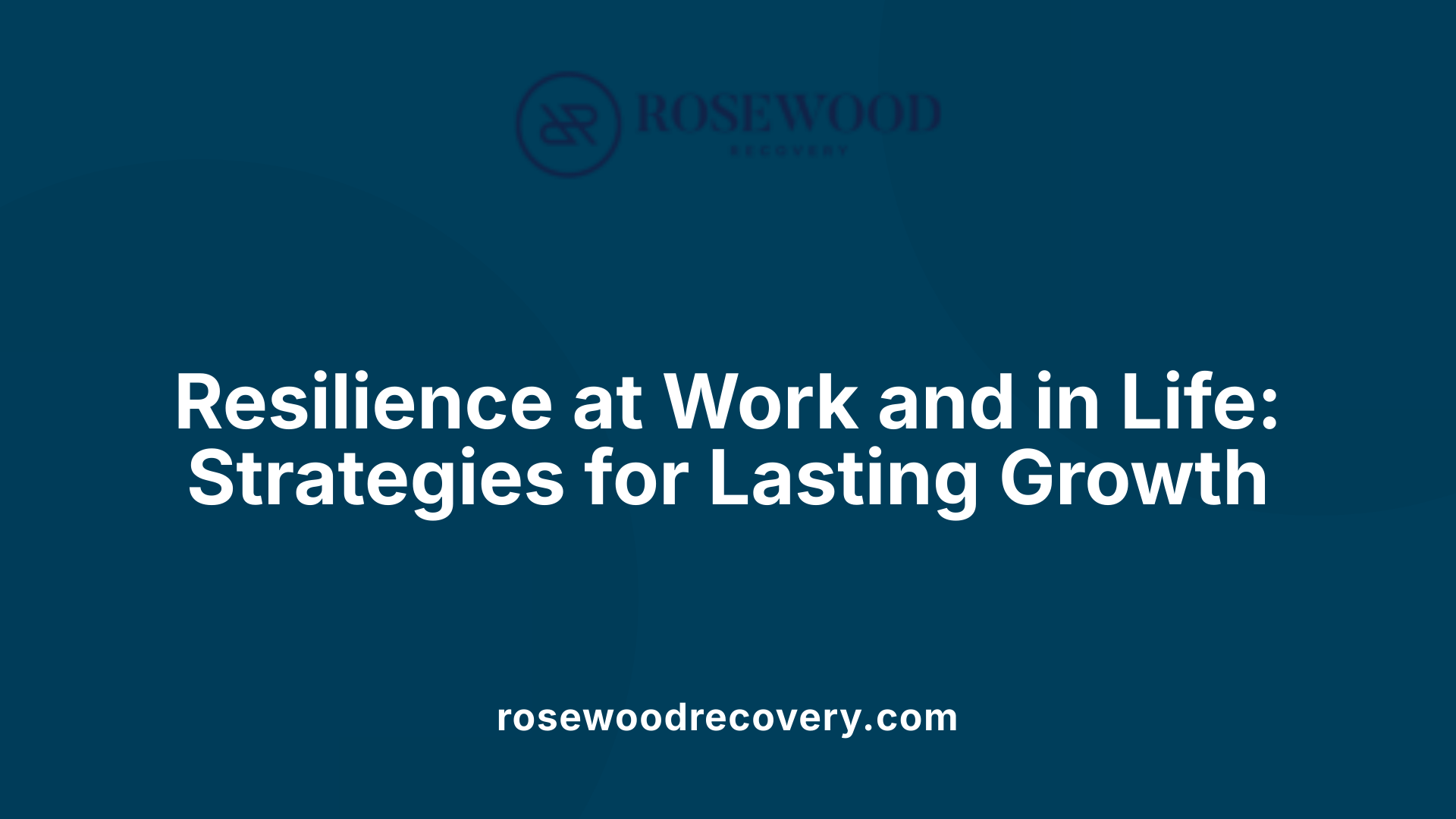
How does resilience support personal development and goal setting?
Resilience plays a vital role in personal development by enabling individuals to handle stress and setbacks effectively. When faced with adversity, resilient people can maintain their motivation and stay focused on their goals. This ability is supported by emotional awareness and self-compassion, which help them accept difficult feelings without being overwhelmed.
Building resilience encourages a mindset that views challenges as opportunities to learn and grow. Strategies like practicing mindfulness, setting clear and manageable goals, and engaging in activities that provide a sense of achievement strengthen the brain's prefrontal cortex. This area is responsible for emotional regulation and decision-making, and enhancing its function improves overall mental wellbeing.
Setting small, attainable goals also activates the brain's reward system. This increases motivation and creates positive neural pathways, making it easier to persevere through difficulties. Over time, resilience helps individuals see setbacks as temporary and solvable, supporting sustained effort towards long-term ambitions.
In summary, resilience not only buffers against stress but also fuels ongoing growth and goal achievement by fostering a balanced perspective, emotional strength, and the perseverance needed to overcome life's inevitable hurdles.
Measuring and Cultivating Resilience and Personal Growth
How can resilience be measured and cultivated effectively?
Resilience can be assessed using various tools designed to evaluate different aspects of an individual's capacity to adapt and thrive. One widely recognized instrument is the Global Assessment Tool (GAT), which measures emotional, family, social, and spiritual fitness. This comprehensive assessment helps individuals and organizations identify strengths and areas for growth in resilience.
Cultivating resilience involves a combination of self-awareness exercises, skill development, and positive psychology practices. Formal training programs play a significant role in this process. For example, the Penn Resiliency Program teaches participants to adopt optimistic thinking, reframe negative beliefs, and improve emotional regulation.
Similarly, the Comprehensive Soldier Fitness initiative emphasizes resilience training through online courses, mastery resilience training for leaders, and psychological fitness testing. Such programs focus on amplifying positive emotions, strengthening relationships, and developing problem-solving skills.
Practicing regular self-reflection, expressive writing, and gratitude journaling can enhance emotional awareness and foster a positive outlook. Engaging in community support, nurturing supportive social bonds, and setting meaningful goals contribute further to resilience building.
In essence, resilience is a learnable and adaptable trait. Its development relies on continuous effort, reflection, and participation in targeted training. Over time, these strategies help individuals not only recover but also thrive after adversity, supporting long-term personal growth and post-traumatic development.
Fostering a Resilient Future
Building emotional resilience is a proactive journey that supports personal and professional development, helping individuals not only recover from setbacks but also thrive amidst change. By adopting practical strategies like mindfulness, cultivating relationships, maintaining optimism, and setting purposeful goals, anyone can enhance their capacity to withstand adversity and turn challenges into opportunities for growth. Developing resilience is an ongoing process rooted in self-awareness, intentional action, and community support. As resilience strengthens, so does the ability to pursue future ambitions with confidence and hope, ultimately leading to a fulfilling and resilient life.
References
- Building your resilience - American Psychological Association
- What Is Emotional Resilience? (+6 Proven Ways to Build It)
- Resilience: Build skills to endure hardship - Mayo Clinic
- Resilience - Ombuds Program - University of Oregon
- Resilience and Adaptability: How You Lead Matters - Niche Academy
- 10 Ways to Build Resilience - Verywell Mind
- Building Resilience | Cornell Health




